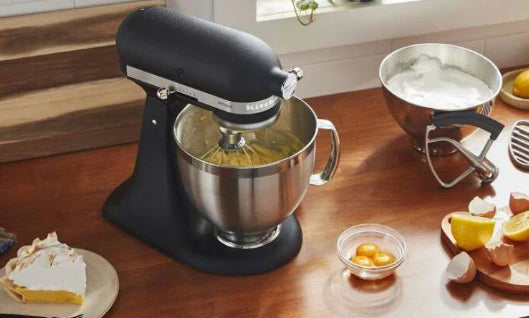Substitutes for Baking
- Binding Without Eggs
- Using Egg Whites
- Substitutes for Cake
What to Use Instead of Eggs When Baking
Eggs provide baked goods with the moisture, structure and leavening they need to become mouth-watering confections. However, a handful of egg substitutes can achieve similar results when eggs aren't an option.
Pay close attention to your recipe to determine how eggs contribute to the final product. If the recipe lacks liquid ingredients, eggs are likely intended to add moisture. Recipes without leavening agents like baking soda or baking powder may rely on eggs to rise, and those without much flour, nuts or breadcrumbs probably use eggs to help bind ingredients.
As you consider which egg substitute is best for your recipe, keep in mind that egg-heavy recipes requiring three or more eggs per batch may not turn out as intended when using egg substitutes. See the list of 11 egg substitutes below to find the right one for the recipe you’re whipping up.
Substitutes
- Mashed Banana - Use about half of a medium banana (or 60ml mashed banana) to replace each egg in recipes like three-layer carrot cake with cream cheese frosting and blackberry cupcakes. Bananas can add a hint of sweetness and flavour to the final product, so steer clear of substituting bananas for eggs in savoury dishes.
- Applesauce - About 60ml of applesauce can work as an egg replacement in baking for dense baked goods like brownies or biscuits. While you can use applesauce in sweets like cakes and cupcakes, you may need to add an extra ½ teaspoon of baking powder to your dry ingredients to create a light and airy final product.
- Silken Tofu - Replace eggs in dense baked goods like pumpkin pie tarts, carrot kale muffins, pumpkin apple bundt cake or quick breads by blending 60ml of silken tofu per egg until it’s completely smooth, then adding it to your recipe.
- Ground Flaxseed or Chia Seeds & Water - Combine 1 tablespoon of ground flaxseed or ground chia seeds with 45ml of water to create a thick, gelatinous mixture for baking without eggs. This replacement works best in dense baked goods like fudge raspberry mocha brownies, chocolate chip biscuits or banana bread, and should sit for several minutes to thicken before you add it to a recipe.
- Yoghurt - Substitute each egg for 60ml of plain yoghurt to help compensate for the moisture eggs add to dense baked goods. Yoghurt substitutes are ideal for things like coconut lime bars, cheddar cheese and chive muffins or fudge brownies with walnuts and dark chocolate glaze, and work best when it’s thoroughly whisked before adding it to a recipe.
- Buttermilk - Replace each egg with 60ml of buttermilk to help create rich and decadent cakes and brownies. Buttermilk can help add moisture and structure to recipes but doesn’t assist with leavening, so only use this substitute in recipes like naked pumpkin cake with caramel buttercream that already have leavening agents on the ingredients list.
- Sweetened Condensed Milk - Substituting 60ml of sweetened condensed milk per egg can help bind ingredients and add structure to recipes like mango curd or Mexican hot chocolate biscuits. Sweetened condensed milk is rich and packed with sugar, so you may need to alter the amount of sugar you add to your recipe accordingly.
- Arrowroot Powder or Cornstarch - Starches like arrowroot powder and cornstarch are ideal egg substitutes for light, fluffy baked goods like mixed berry and almond cake, but can also work in custard, curd or pudding recipes that typically rely on eggs as a thickening agent. Replace each egg with 2 tablespoons of arrowroot powder or cornstarch combined with 45ml of water.
- Vinegar & Baking Soda - Combining 1 tablespoon of vinegar with 1 teaspoon of baking soda creates a chemical reaction that releases carbon dioxide, replacing the leavening typically achieved with eggs to produce light and airy baked goods. Use this combination to replace each egg in fluffy confections like strawberry shortcake cupcakes, mini lemon cake or homemade pancakes.
- Oil, Water & Baking Powder - Whisk together 1 teaspoon of vegetable oil, 30ml of water, and 2 teaspoons of baking powder to replace each egg in baked goods like biscuits, brownies or quick breads. This mixture won’t alter the flavour profile of your recipes the way other egg substitutes might.
- Aquafaba (Canned Chickpea Liquid) - Use 45ml of aquafaba for each egg in recipes such as pistachio sour cream coffee cake. It's also great for making whipped toppings or meringues.
Binding Food Without Using Eggs
Bind ingredients for savoury recipes like meatloaf or mini spiralised sweet potato casseroles by substituting each egg with 60ml of pureed silken tofu or 1 tablespoon of soy lecithin. For sweet recipes like soft and chewy lemon lavender biscuits or chocolate coconut custard pie, try using 30ml of water mixed with 2 tablespoons of arrowroot powder or 1 tablespoon of ground flaxseed. Allow the mixture to sit until it thickens before adding it to your recipe.
Substituting Egg Whites for Whole Eggs in Baking
You can replace whole eggs with egg whites in recipes primarily using eggs to bind ingredients. Use about 60ml of egg whites for each whole egg to maintain the volume. Egg whites help baked goods hold their shape and structure, while egg yolks add richness and assist in browning. Adjust other ingredients as needed to compensate for the moisture and softness usually provided by egg yolks.
Best Substitute for Eggs in Cake
To keep cakes light and airy, use 1 teaspoon of baking soda mixed with 1 tablespoon of vinegar, 60ml of plain yoghurt, or 60ml of buttermilk as a substitute for each egg. Avoid using denser substitutes like flaxseed or silken tofu in fluffy cakes, as these are more suited to denser baked goods.

